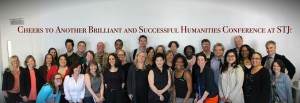
 The gorgeous spring day of the Launch Conference for the SJU English PhD started early. ABD student Tara Bradway’s inspired performance of a speech of Hamlet’s provided a special treat to the early arrivers:
The gorgeous spring day of the Launch Conference for the SJU English PhD started early. ABD student Tara Bradway’s inspired performance of a speech of Hamlet’s provided a special treat to the early arrivers:
Yea, from the table of my memory
I’ll wipe away all trivial fond records,
All saws of books, all forms, all pressures past
That youth and observation copied there,
And thy commandment all alone shall live
Within the book and volume of my brain,
Unmix’d with baser matter (1.5)
Her powerful performance set the tone: the PhD program we launched in Queens on Big Will’s 400th deathaversary aims to bring things together. The day’s talks, questions, and conversations would go on to combine Hamlet’s speculative intellectualism with the energies and commitments that come from our hearts and stomachs.
I’m happy to say that the day proceded with that same intensity, curiosity, and spirit of play.
The first plenary panel featured three innovative dissertation projects that work across the boundaries of literary studies, writing studies, and critical theory. Nancy Alvarez brought forward her research on Latina voices — nuestras voces — in University Writing Centers as a way to combat monolingualism and hierarchy in our shared spaces. Meghan Nolan dazzled us with a description of her recently-defended PhD thesis that combines the heteronymic poetics of Fernando Pessoa with more familiar names such as Yeats, Eliot, and Pound — and then she connected all these poets to 21c phenomena incluidng internet “catfishing” and the many voices that struggle to emerge in first-year writing classrooms. Laura Lisabeth demonstrated how much the canonization of Strunk and White’s Elements of Style owed to Cold War cultural imperatives; in doing so she complicated and enriched our understandings of this beloved but still under-analyzed style manual.
I wasn’t able to triplicate myself for the three morning sessions, so I can’t report on the “Poetics, Criticism, Translation” panel that featured Abrianna Jette’s project on poetics in the composition classroom or Phil Grayson’s wonderfully titled “Notes toward a Speculative Theory of the Poetics of Whether or Not Laserbeams Shoot Our of Our Eyes.” I also missed Laura McCalla’s exploration of biracialism in contemporary films and Heather Pope’s exploration of “Muslim Containment Culture” in post-9/11 America.
Forced to choose, I went with my own early modern period, where I heard to two great papers on premodern England. Jane Clay explored an anonymous play, “Respublica,” that appears to have been written in an attempt to convince Mary Tudor to share power with Parliament. Danielle Lee explored the theological underpinnings of Sir John Mandeville’s Travels, a popular and fantastical 14c travelogue that — whether or not Mandeville really made it to China and the Earthly Paradise, as he claims — shows how ideas about Africa and racial difference were circulating in premodern England.
After lunch in the Institute for Writing Studies, we returned for two more plenary sessions. In a panel about “Feminism and Race: Reimagining the Future,” Regina Duthley brought the Beyonce with a talk about “Black Feminist Formations” that opened into a wide-ranging project about black feminist resistance in digital culture. Regina Corallo also spoke about how digital technology is changing the work of memory and resistance in the twenty-first century, in particular in the film archives assembled by Afghan-American artist Mariam Ghani.
The final panel, “Vernacular Imaginings in the Atlantic World,” explored how transatlantic travel changed Anglophone literary culture across the eighteenth century. Donna Downing gave us an eye-opening look at how Aphra Behn’s career as a spy intersected with and perhaps facilitated her literary career. Anwar Uhuru explored classicism and nativism in the poetry of Phillis Wheatley, arguing that the first African-American poet, who was enslaved in Boston when her poems were published in the 1770s, combined African and classical forms and methods in her verse.
In focusing on the students who presented, I’ve hidden until now the brilliant contributions of our distinguished visiting speakers, who helped make the day such a success. D’Angelo Chair LuMing Mao set the tone with an incisive (and impromptu) analysis of “invention,” “becoming,” and “fragmentation” as key terms for the first plenary panel. I missed Dr. Steve Monte of CUNY Staten Island, the poet Paul LeGault, and Dr. Paul Devlin of the US Merchant Marine Academy in the morning sessions, but I greatly enjoyed hearing my old grad school buddy Dr. Tom Fulton of Rutgers explore “political theology” in St Paul, early English Bibles, and Henry V. Joan Morgan, NYU grad student, hip-hop journalist, and author of When Chickenheads Come Home to Roost, gave a passionate account of her current work in “pleasure politics” inside of Black Feminist Thought. Dr Steve Newman of Temple University closed us out with a lively account of Scottish ballads and their complex multi-linguistic positioning.
We finished our day across Union Turnpike at Nikko Habachi, which has — alas! — replaced everyone’s favorite local dive bar The Sly Fox. The good news is the food is much improved.
Looking forward to seeing everyone next year!

What a wonderful day all around. Looking forward to next year’s Conference. Special thanks to Dr. Mentz for all he did to make this a great success!